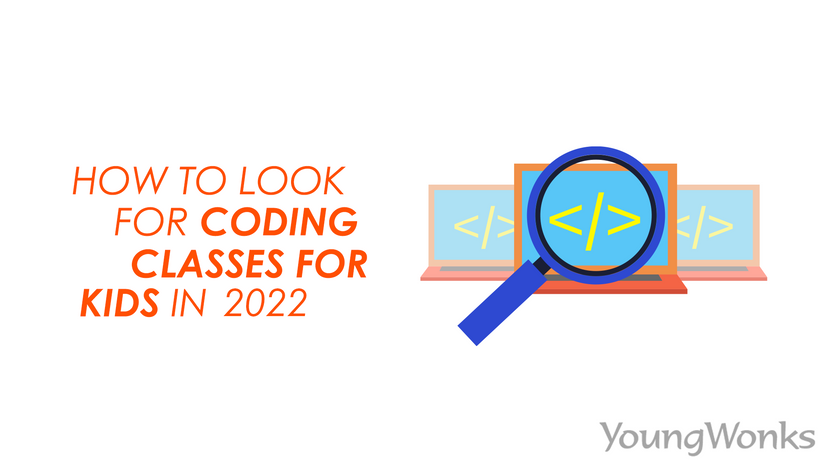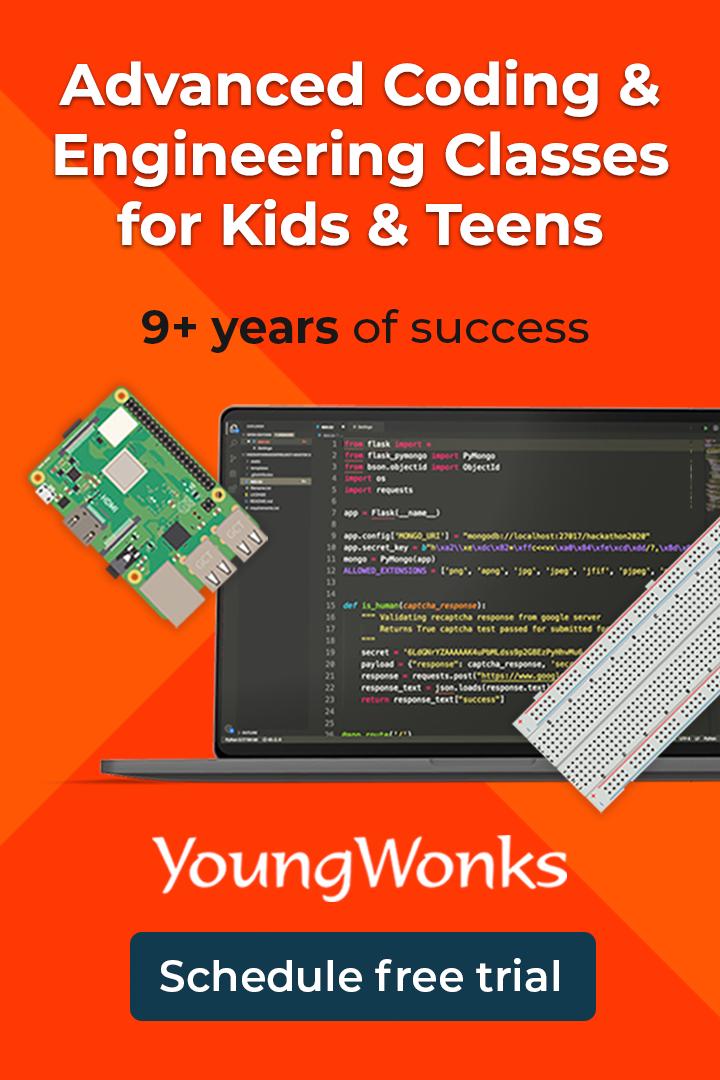May 20, 2021 By Team YoungWonks *
How can one decide on a coding class for one’s kid? This is a rather relevant question today, especially in light of the many kids coding classes available today. 2020 and 2021 saw edtech grow phenomenally, even as education became more of a virtual affair than ever before and more parents realised the importance of teaching their children programming.
As is the case with most things, starting early does give one an advantage over others. An early exposure (ages 8 and above) is ideal since they have good grasping power at that age. This initial learning in coding will definitely help them when they opt for Computer Science (CS) at a later age.
Shared below are a few key criteria that parents can bear in mind before selecting a coding program for their kids:
1. An initial focus on fundamentals
Coding is essentially about logic and reasoning, so it’s important to find a coding class that can teach your kid the abstract concepts behind how code works instead of just having them learn to pattern-recognize in one specific programming language. A true understanding of concepts trumps rote learning and it’s important to find a coding program that lays emphasis on the former. Even as kids go to higher levels, this becomes more and more crucial.
2. Free-form learning
Learning by doing is a great approach and for students to understand coding, they should ideally explore concepts by using them in their own projects. In fact, a good coding program for kids would help students learn how to take a software project from idea to architecture to completion. At the same time, such a school wouldn’t prescribe projects with exact instructions either. Rather it would encourage its students to pursue their own projects and help them along the way. Giving students the freedom to explore with ideas of their own and learn is a valuable takeaway.
3. Teaching real world technologies
This is another key criterion. Students who are taught to use real world technologies are anyday better-equipped to enter the job market or pursue their own personal projects than those who are not. A student who has learned coding with modern technologies used in the industry today is at a great advantage over others.
4. Project-based learning
While there is no doubt that solving small, isolated programming problems is good for practice, most real coding takes place as part of larger projects. So it’s important for kids to be in a program focusing on project-based learning as it will certainly help them develop their skill set early on to become effective real-world programmers.
5. Events
A good coding school regularly hosts events such as hackathons and show-and-tell fairs to keep their students engaged. These events incentivise students to learn coding and use their knowledge to build and showcase interesting projects like games, apps and robots.
6. Sense of community
The support of a strong community can go a long way in helping a student learn something new, even if it appears intimidating at first. It’s extremely important that students learn to collaborate and help each other learn, especially for larger projects that need team effort.
7. Good operations
Practice what you preach is an apt saying here. Not many know about this point but coding schools employing good coders usually build their own robust homework assignment/review/practice system for students to strengthen their skills outside of class. The quality of such in-house systems can often tell you what quality of code your child will be taught.
8. Regular evaluations
Also an underrated criterion. Given that coding as a skill set builds on itself continually, coding schools should regularly evaluate their students’ progress to ensure that no important foundational concepts are missed.
9. Assistance between classes
Students should always be able to get help with their homework when they need it between classes. This will make sure they do not feel stuck and / or helpless. Often this happens and the student can lose interest over just a minor setback. Timely assistance in such situations can make a world of a difference.
10. Qualified teachers with experience
Coding is as much an art as it is engineering, so it’s important that teachers have significant experience with real-world coding so that they can warn students of potential pitfalls. They will have hands-on experience and knowledge about how coding works outside a classroom and that is something that students should have access to.
In addition to the above, there are other factors parents can keep in mind such as safety and security in an online class; a healthy student-teacher ratio to make sure your child gets the individual attention he/ she deserves; a well-defined curriculum organised into lessons, worksheets and homework; flexible schedule; a live class over a recorded session and an impressive track record.
Most important of all, parents should make sure that a coding program is not ‘watered-down’ for kids. They need to realise that kids are entirely capable of learning professional-level programming skills as long as they are taught in a kid-friendly way, so there is no excuse for coding programs that hide or skip more complex concepts in the name of kid-friendliness. Thus, it is recommended to go for a coding program that will teach your child concepts that are actually used across industries in the world today.
Selecting the Right Coding Program for Your Child in 2024
When looking for Coding Classes for Kids, it's essential to find programs that not only teach coding fundamentals but also instill a love for technology and innovation. At YoungWonks, we offer a diverse range of coding courses tailored to young minds. Our Python Coding Classes for Kids are perfect for those who wish to master one of the most popular programming languages in the world today, setting a strong foundation for future learning. Additionally, for students interested in hardware and game development, our Raspberry Pi, Arduino and Game Development Coding Classes provide an excellent opportunity to engage in hands-on projects, fostering creativity and problem-solving skills. These programs are designed to equip children with the necessary tools to thrive in the digital age, all while having fun and making lasting friendships.
*Contributors: Written by Vidya Prabhu; Lead image by: Leonel Cruz

